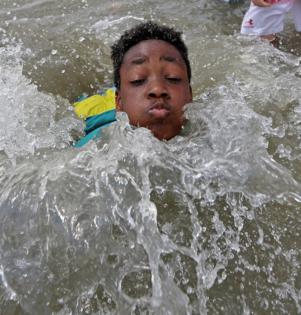47 Massachusetts beaches reached dangerous levels of fecal bacteria regularly: Report
Published in News & Features
Over half of all Massachusetts beaches had an unsafe level of fecal bacteria last year, and 47 beaches reached the danger zone at least a quarter of the time they were tested, according to an Environment Massachusetts Research and Policy Center report released Wednesday.
“Our researchers looked at tests for bacteria that indicate the likely presence of fecal matter in the water,” said Devon Bell, associate with Environment Massachusetts, standing in front of a cloudy Constitution Beach in East Boston. “And they found that Constitution Beach had enough fecal matter indicator bacteria to put swimmers’ health at risk on 24% of days tested last year. And this was a widespread issue across the state.”
The report analyzed how many days over 3,000 beaches across the U.S. hit a dangerous threshold of fecal indicator bacteria. Nationwide, 61% of tested beaches tested positive for contamination at least once in 2024.
The threshold, the EPA’s “Beach Action Value,” is associated with an estimated illness rate of 32 out of every 1,000 swimmers. Swimmers in polluted water may develop gastrointestinal illness, respiratory disease, ear and eye infection, and skin rash, the report states.
The 47 beaches in Massachusetts with the higher numbers of dangerous pollution days spread across the state’s coast, researchers said, including North Shore, South Shore, Boston, Cape Cod, Buzzards Bay and the Islands.
“If we were to look carefully, it would be quite likely many of these beaches would be downstream from sewage overflows or significant sources of runoff pollution, because we know fecal indicator bacteria often runs in that wastewater,” said John Rumpler, Environment Massachusetts’s Clean Water Director and report co-author. “So that would be the common denominator. But I would just say rich or poor or in between, whether we’re in Wellesley or Needham or Cape Cod or the North Shore or right here in Boston, everybody deserves a safe, clean beach.”
Coastal waters can see this type of pollution in instances when heavy rains overload sewage treatment plants — “an issue that we’ve seen a lot in (the) Charles River and in the Mystic River,” Bell said — or rainwater washes waste across paved areas into nearby water.
The issue can be addressed by “repairing and upgrading sewage infrastructure” and green infrastructure projects to “absorb rainwater and reduce runoff pollution,” Bell said.
The EPA has estimated Massachusetts needs $21.7 billion to address the wastewater issues over the next 20 years, advocates cited. In Congress, the House Appropriations Committee voted to cut funding for the Clean Water State Revolving Fund by 26%, though the cuts were taken out by the Senate.
While the ultimate legislation is being decided, Rumpler urged all Americans “to tell their representatives they want their waters to be safe for swimming, and they’re willing to have taxpayer dollars pay for it.”
Environmental advocates also spoke in favor of state legislation on Beacon Hill, including bills that would require timely public notification when sewage overflows occur, mandate water utilities reduce sewer overflows and support local clean water improvements.
It takes “significant resources” to address the issue, Rumpler said, noting the progress made when the city invested in the Boston Harbor cleanup.
“Let’s make our beaches clean and safe, not just sometimes, but always,” said Seaside Sustainability director Eric Magers. “Let’s protect our health and our economy and our environment. Let’s act together before another family is turned away.”
_____
©2025 MediaNews Group, Inc. Visit at bostonherald.com. Distributed by Tribune Content Agency, LLC.







Comments